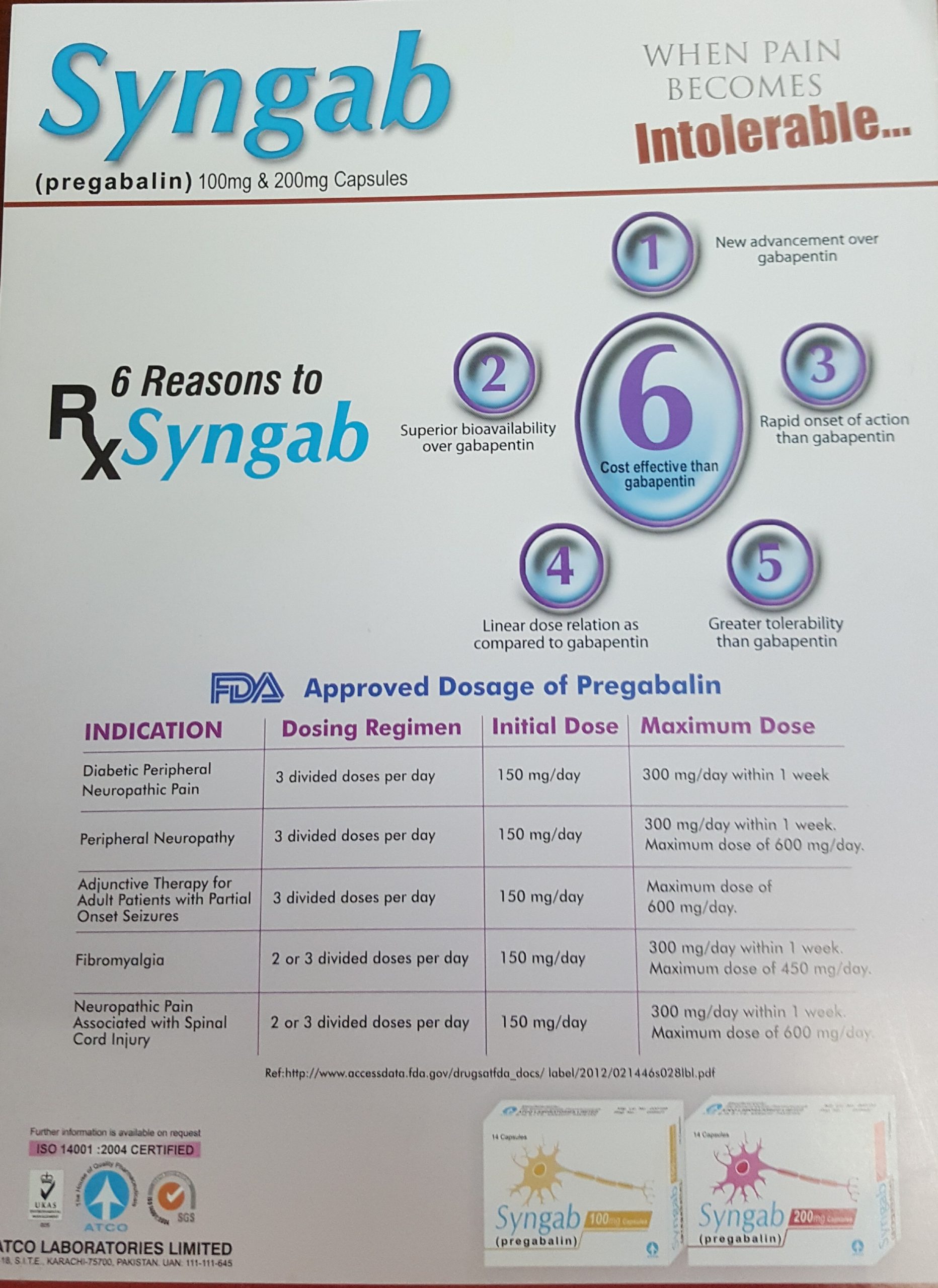SYNGAB (Pregabalin 100 & 200 mg Capsules) is an oral anticonvulsant and neuropathic pain medication designed to provide effective relief from various neurological and psychological conditions. Each capsule contains either 100 mg or 200 mg of Pregabalin, a medication that modulates calcium channels in the central nervous system to reduce the release of neurotransmitters involved in pain and seizure activity. SYNGAB is commonly prescribed for managing partial seizures in epilepsy, alleviating neuropathic pain associated with diabetic peripheral neuropathy and postherpetic neuralgia, and treating generalized anxiety disorder in certain regions. Its versatile formulation ensures targeted and sustained relief, enhancing the quality of life for individuals suffering from chronic pain and seizure disorders.
Key Features and Benefits:
- Effective Anticonvulsant: SYNGAB is an essential adjunctive therapy for managing partial-onset seizures in individuals with epilepsy, helping to reduce the frequency and severity of seizures.
- Neuropathic Pain Relief: Provides significant alleviation from neuropathic pain caused by diabetic peripheral neuropathy and postherpetic neuralgia, improving daily functioning and comfort.
- Anxiety Management: In certain countries, SYNGAB is approved for the treatment of generalized anxiety disorder, offering a reliable option for individuals seeking relief from chronic anxiety symptoms.
- Dual Dosage Options: Available in 100 mg and 200 mg capsules, allowing for flexible dosing tailored to individual patient needs and treatment plans.
- Improved Quality of Life: By effectively managing seizures, reducing chronic pain, and alleviating anxiety, SYNGAB enhances overall well-being and daily functioning.
- Minimal Sedative Effects: Unlike some other anticonvulsants, Pregabalin has a lower risk of causing sedation, allowing patients to maintain their daily activities without significant impairment.
- Convenient Oral Administration: Capsules are easy to swallow and integrate seamlessly into daily medication regimens, ensuring adherence and consistent therapeutic outcomes.
- Proven Efficacy: Pregabalin has a well-established track record in clinical studies, demonstrating its effectiveness and safety in treating a variety of conditions.
Usage Instructions:
- Dosage:
- Epilepsy (Partial-Onset Seizures): The typical starting dose is 150 mg per day, divided into two or three doses. Dosage may be adjusted based on individual response and tolerance.
- Neuropathic Pain:
- Diabetic Peripheral Neuropathy: Commonly prescribed at 300 mg per day, divided into two doses.
- Postherpetic Neuralgia: Similar dosing as diabetic neuropathy, with adjustments as needed.
- Generalized Anxiety Disorder: Dosing varies by country and specific patient needs. Consult a healthcare professional for personalized dosing.
- Administration:
- Take SYNGAB capsules orally with or without food.
- Swallow the capsules whole with a glass of water. Do not chew or crush them.
- Frequency:
- Typically administered two to three times daily, depending on the condition being treated and the prescribed dosage.
- Consistency:
- Take SYNGAB at the same times each day to maintain even levels of the medication in your bloodstream.
- Missed Dose:
- If you miss a dose, take it as soon as you remember. If it is near the time of the next dose, skip the missed dose. Do not double the dose to catch up.
Precautions:
- Medical Consultation: Always use SYNGAB under the supervision of a qualified healthcare professional to ensure appropriate treatment and to minimize risks.
- Allergic Reactions: Discontinue use and seek immediate medical attention if you experience signs of an allergic reaction, such as rash, itching, swelling, severe dizziness, or difficulty breathing.
- Pre-existing Conditions: Inform your healthcare provider if you have a history of kidney disease, heart problems, or any other significant medical conditions, as dosage adjustments may be necessary.
- Pregnancy and Breastfeeding: Consult your healthcare provider before using SYNGAB if you are pregnant, planning to become pregnant, or breastfeeding, as it may affect the baby.
- Drug Interactions: Inform your healthcare provider about all other medications you are taking, including over-the-counter drugs and supplements, as Pregabalin may interact with other treatments.
- Suicidal Thoughts: Antiepileptic drugs, including Pregabalin, may increase the risk of suicidal thoughts or behavior. Monitor for changes in mood or behavior and seek immediate medical attention if such symptoms occur.
- Discontinuation: Do not abruptly stop taking SYNGAB without consulting your healthcare provider, as this may lead to withdrawal symptoms or increased seizure frequency.
Possible Side Effects:
- Common Side Effects:
- Dizziness or lightheadedness
- Drowsiness or fatigue
- Dry mouth
- Swelling in the hands or feet (peripheral edema)
- Blurred vision
- Weight gain
- Less Common Side Effects:
- Constipation
- Difficulty concentrating or memory issues
- Increased appetite
- Mood changes, including depression or anxiety
- Serious Side Effects (Seek Medical Attention Immediately):
- Severe allergic reactions (rash, itching, swelling, severe dizziness, difficulty breathing)
- Unusual changes in mood or behavior, such as depression or suicidal thoughts
- Signs of kidney problems (changes in urine output, swelling, unexplained weight gain)
- Vision changes or eye pain
Storage Instructions:
- Temperature: Store SYNGAB capsules at room temperature, away from excess heat and moisture.
- Accessibility: Keep the medication out of reach of children to prevent accidental ingestion.
- Packaging Integrity: Ensure the bottle is tightly closed after each use to maintain the efficacy and safety of the medication.
- Expiration: Do not use the capsules beyond the expiration date indicated on the packaging. Discard any unused medication after this date.


